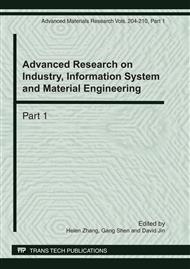[1]
V. Marianov, C. ReVelle, The queuing probabilistic location set covering problem and some extensions, Socio-Economic Planning Sciences, Vol. 28, No. 3 (1994), pp.167-178.
DOI: 10.1016/0038-0121(94)90003-5
Google Scholar
[2]
M.J. Canos, C. Ivorra, V. Liern, Exact algorithm for the fuzzy p-median problem, European Journal of Operational Research, Vol. 116, No. 1 (1999), pp.80-86.
DOI: 10.1016/s0377-2217(98)00330-0
Google Scholar
[3]
Liu B., Uncertainty Theory, 2nd ed., Berlin: Springer-Verlag, (2007).
Google Scholar
[4]
Liu B., Uncertainty Theory: A Branch of Mathematics for Modeling Human Uncertainty, Berlin: Springer-Verlag, (2010).
Google Scholar
[5]
Gao X., Some properties of continuous uncertain measure, International Journal of Uncertainty, Fuzziness and Knowledge-Based Systems, Vol. 17, No. 3 (2009), pp.419-426.
DOI: 10.1142/s0218488509005954
Google Scholar
[6]
You C., Some convergence theorems of uncertain sequences, Mathematical and Computer Modeling, Vol. 49, No. 3-4 (2009), pp.482-487.
Google Scholar
[7]
Li X. and Liu B., Hybrid logic and uncertain logic, Journal of Uncertain Systems, Vol. 3, No. 2, 3 (2009), pp.83-94.
Google Scholar
[8]
Liu B., Uncertain set theory and uncertain inference rule with application to uncertain control, Journal of Uncertain Systems, Vol. 4, No. 2, (2010), pp.83-98.
Google Scholar
[9]
Gao X., Gao Y., and Ralescu D.A., On Liu's inference rule for uncertain systems, International Journal of Uncertainty, Fuzziness and Knowledge-Based Systems, Vol. 18, No. 1 (2010), pp.1-11.
DOI: 10.1142/s0218488510006349
Google Scholar
[10]
Liu Y., and Ha M., Expected value of function of uncertain variables, Journal of Uncertain Systems, Vol. 4, No. 3, (2010), pp.181-186.
Google Scholar
[11]
Liu, B., Theory and Practice of Uncertain Programming, 2nd ed., Berlin: Springer-Verlag, (2009).
Google Scholar
[12]
Liu, B., Some research problems in uncertainty theory, Journal of Uncertain Systems, Liverpool, Vol. 3, No. 1 (2009), pp.3-10.
Google Scholar
[13]
Liu B., Uncertain Risk Analysis and Uncertain Reliability Analysis, Journal of Uncertain Systems, Liverpool, Vol. 4, No. 3 (2010), pp.163-170.
Google Scholar
[14]
Zhu Y., Uncertain optimal control with application to a portfolio selection model, Cybernetics and Systems, London, Vol. 41, No. 7 (2010), pp.163-170.
Google Scholar
[15]
Storn R, Price K. Differential evolution—a simple and efficient adaptive scheme for global optimization over continuous spaces, ICSI, Technical Report TR-95-012, (1995).
Google Scholar


